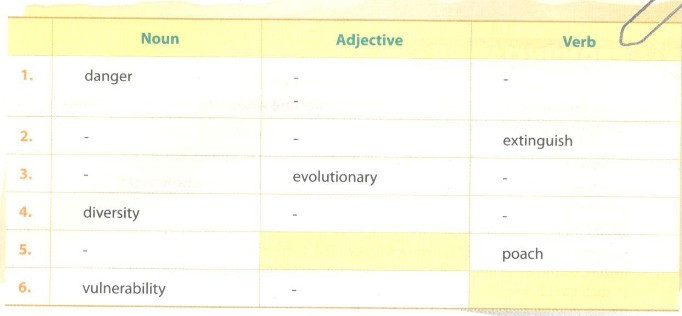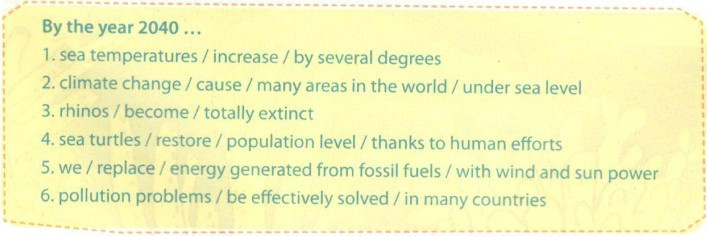SBT Tiếng Anh 12 mới Unit 6: Vocabulary & Grammar trang 6
SBT Tiếng Anh 12 mới Unit 6: Vocabulary & Grammar trang 6
1. (Trang 6 - Tiếng anh 12): Complete the following table. (Hoàn thành bảng dưới đây)

Lời giải:
1. dangerous, endangered (adj) / endanger (v)
2. extinction (n) / extinct (adj)
3. evolution (n) / evolve (v)
4. diverse (adj) / diversify (v)
5. poacher (n)
6. vulnerable (adj)
(Chọn các từ trong bảng đã hoàn thành để hoàn thành các câu. Thay đổi hình thức từ những chỗ cần thiết.)
1. Many people think the money spent on protecting __________species should be used for improving the lives of the local people.
2. Animals classified as CR on the conservation status scale are in danger of__________ .
3. Old people and children are particularly_____ to lung diseases in the cold weather.
4. Elephants are usually ______ for their tusks, while rhinos are killed for their horns.
5. This river used to have the greatest__________ of freshwater fish in the country, but now very few species are found here.
6. The new__________ theory has combined Darwin's theory of natural selection with genetic factors to explain how__________occurs.
Lời giải:
1. Many people think the money spent on protecting endangered species should be used for improving the lives of the local people.
(Nhiều người nghĩ rằng số tiền chi cho việc bảo vệ các loài quý hiếm cần được sử dụng để cải thiện cuộc sống của người dân địa phương.)
2. Animals classified as CR on the conservation status scale are in danger of extinction.
(Loài vật được phân loại là CR trên diện hiện trạng bảo tồn đang có nguy cơ tuyệt chủng)
3. Old people and children are particularly vulnerable to lung diseases in the cold weather.
(Người già và trẻ em đặc biệt dễ bị bệnh phổi trong thời tiết lạnh.
4. Elephants are usually poached for their tusks, while rhinos are killed for their horns.
(Voi thường bị săn bắn để lấy ngà, trong khi con tê giác bị giết để lấy sừng.)
5. This river used to have the greatest diversity of freshwater fish in the country, but now very few species are found here.
(Con sông này từng có sự đa dạng lớn nhất của loài cá nước ngọt trong nước, nhưng bây giờ rất ít loài được tìm thấy ở đây.)
6. The new evolutionary theory has combined Darwin's theory of natural selection with genetic factors to explain how evolution occurs.
(Lý thuyết tiến hóa mới đã kết hợp thuyết chọn lọc tự nhiên với các yếu tố di truyền của Darwin để giải thích tiến hóa xảy ra như thế nào.)
(Dưới đây là những ghi chú của một nhà môi trường học, dự đoán cách thế giới sẽ thay đổi vào năm 2040. Sử dụng các ghi chú để viết câu ở thì tương lai hoàn thành. Câu đầu tiên đã được thực hiện cho bạn.)

Lời giải:
2. climate change will have caused many areas in the world to be under sea level.
(biến đổi khí hậu sẽ biến nhiều khu vực trên thế giới ở dưới mực nước biển.)
3. rhinos will have become totally extinct.
(tê giác sẽ trở nên hoàn toàn tuyệt chủng.)
4. sea turtles will have restored their population-level thanks to human efforts.
(rùa biển sẽ phục hồi mức độ dân số của chúng nhờ vào những nỗ lực của con người.)
5. we will have replaced energy generated from fossil fuels with wind and sun power.
(chúng ta sẽ thay thế năng lượng được tạo ra từ nhiên liệu hóa thạch bằng gió và năng lượng mặt trời.)
6. pollution problems will have been effectively solved in many countries.
(vấn đề ô nhiễm sẽ được giải quyết một cách hiệu quả ở nhiều nước.)
(Hoàn thành câu với những từ ngữ thích hợp trong hộp. Một từ có thể được sử dụng nhiều hơn một lần.)
|
more less faster better harder higher stricter |
1. The ________ you water this plant, the ________it will grow.
2. The ________ fast food you eat, the ________healthy you might become.
3. The ________ our laws against poaching are, the ________ chances there are for endangered animals to survive.
4. The ________ the demand for ivory products is, the ________ the number of elephants falls.
5. The ________ you study for the exam, the ________ your scores will be.
Lời giải:
1. The more you water this plant, the faster/better it will grow.
(Bạn càng tưới cây này nhiều, nó sẽ càng lớn nhanh)
2. The more fast food you eat, the less healthy you might become.
(Bạn càng ăn nhiều đồ ăn nhanh, bạn có thể càng trở nên kém khoẻ mạnh hơn)
3. The stricter our laws against poaching are, the more chances there are for endangered animals to survive.
(Luật của chúng ta càng nghiêm khắc đối với hành vi săn bắt trộm, càng có nhiều cơ hội cho động vật quý hiếm sống sót)
4. The higher the demand for ivory products is, the faster the number of elephants falls.
Tạm dịch: Nhu cầu về sản phẩm từ ngà voi càng cao, số lượng voi bị giết càng nhanh
Giải thích: demand đi với tính từ high hoặc low diễn tả nhu cầu cao hay thấp, fast low đi với sự gia tăng hoặc giảm đi của số lượng 'the number of elephants falls'
5. The more/harder you study for the exam, the higher/better your scores will be.
(Bạn càng học chăm chỉ cho kì thi, điểm của bạn sẽ càng cao.)
(Mỗi câu sau đây có một lỗi sai. Gạch dưới những lỗi sai và viết những chỉnh sửa ở chỗ được cung cấp.)
1. I'll wait for you here until you will have finished your work.
2. The faster you drive, it becomes more dangerous
3. By the time we will have got to the conference about wildlife protection, the opening speech has started.
4. The more severe climate change becomes, the more serious wildlife is affected.
5. More people move to the city, the higher the cost of living there gets.
Lời giải:
1.
Đáp án: will have finished -> have finished
Giải thích: Simple future + Until + Present simple/ Present perfect: Dùng với nghĩa là sẽ làm gì cho đền khi hoàn thành việc gì đó
2.
Đáp án: it becomes more dangerous -> the more dangerous it becomes
Giải thích: cấu trúc so sánh càng càng: The + Comparative + S1 + V1, the + Comparative + S2 + V2
3.
Đáp án: will have got -> get
Giải thích: Cấu trúc: By the time + S1 + V1 (hiện tại đơn), S2 + V2 (tương lai đơn/ tương lai hoàn thành)
Cấu trúc ngữ pháp này được gọi là mệnh đề thời gian mang nghĩa tương lai. Dùng để diễn tả: Trong tương lai, lúc một sự việc (S1 + V1) nào đó đã xảy ra thì một sự việc khác (S2 + V2) xảy ra/ hoàn thành rồi.
4.
Đáp án: serious -> seriously
Giải thích: seriously dùng làm trạng từ so sánh bổ nghĩa cho động từ affacted
5.
Đáp án: More -> The more
Giải thích: cấu trúc so sánh càng càng: The + Comparative + S1 + V1, the + Comparative + S2 + V2